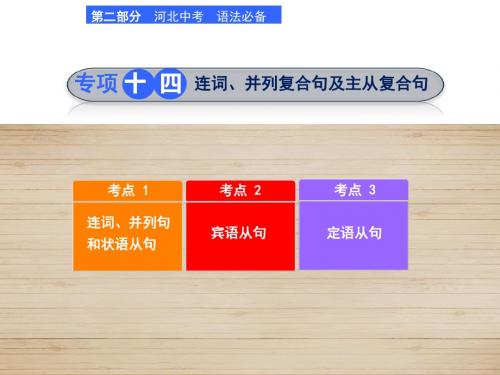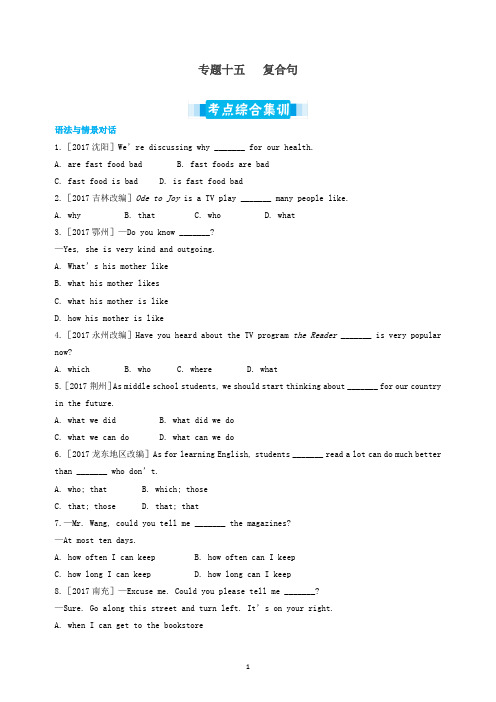2018届中考英语专题复习专题十五复合句课件201806251113
- 格式:ppt
- 大小:2.79 MB
- 文档页数:30




专题十五复合句语法与情景对话1.[2017沈阳]We’re discussing why _______ for our health.A. are fast food badB. fast foods are badC. fast food is badD. is fast food bad2.[2017吉林改编]Ode to Joy is a TV play _______ many people like.A. whyB. thatC. whoD. what3.[2017鄂州]—Do you know _______?—Yes, she is very kind and outgoing.A. What’s his mother likeB. what his mother likesC. what his mother is likeD. how his mother is like4.[2017永州改编]Have you heard about the TV program the Reader _______ is very popular now?A. whichB. whoC. whereD. what5.[2017荆州]As middle school students, we should start thinking about _______ for our country in the future.A. what we didB. what did we doC. what we can doD. what can we do6.[2017龙东地区改编]As for learning English, students _______ read a lot can do much better than _______ who don’t.A. who; thatB. which; thoseC. that; thoseD. that; that7.—Mr. Wang, could you tell me _______ the magazines?—At most ten days.A. how often I can keepB. how often can I keepC. how long I can keepD. how long can I keep8.[2017南充]—Excuse me. Could you please tell me _______?—Sure. Go along this street and turn left. It’s on your right.A. when I can get to the bookstoreB. when can I get to the bookstoreC. how I can get to the bookstoreD. how can I get to the bookstore9.[2017河南]I hate the dogs _______ live in the next house. They make loud noises all night.A. whoB. thatC. WhatD. whom10.—What did Mr. Green say just now?—He asked us _______ tomorrow.A. what will the weather be likeB. what the weather would likeC. what would the weather be likeD. what the weather would be like11.Mom often parks her car near the house _______ she can easily get to.A. whereB. whoC. whichD. what12.I have waited here for a long time. Could you tell me _______ back?A. when will he comeB. when does he comeC. when he will comeD. when he came13.[2017黔东南]I think the boy _______ is in white is his brother.A. whatB. whichC. whoD. whom14.—Could you tell me _______ the museum?—The day after tomorrow, I think.A. when will you visitB. when you will visitC. when you would visitD. when would you visit15.[2017临沂]Roald Dahl was a great children’s writer. His dark past helped him painta picture _______ was different to most other writers.A. thatB. whoC. /D. whom16.—Could you tell me _______?—Maybe this weekend, because they have already got everything ready.A. what they want to do in New YorkB. when they will leave for New YorkC. whether they will go to New YorkD. why they will leave for New York17.[2017泰安]Yesterday Mr. Green went to his hometown and visited the old house _______ he was born in.A. whichB. whereC. whatD. it18.I want to buy some books in Hebei Book Wholesale Market tomorrow, but I don’t know _______.A. when I can goB. where I can goC. how I can goD. what I can do19.Could you tell me _______?I want to send her a gift.A. what our teacher doesB. where our teacher livesC. how our teacher is likeD. when our teacher come20.[2017成都改编]A kind of shared bike _______ is called bluegogo is getting more and more popular in Chengdu.A. itB. whoC. whichD. what21.They solved the problem in the end. Yet I really don’t know _______.A. what’s the problemB. how they made itC. why they made itD. who solved it22.[2017十堰]This is a heartwarming story about a boy _______ saved his mother’s life.A. whichB. whoC. whoseD. whom23.We’ll hold a pizza party near the Riverside Lake next Sunday, I wonder _______.A. where we’ll have itB. who will be invitedC. when we’ll hold the partyD. what party we will hold24.—Do you know _______? Many Chinese are moved by his story.—Yes, I do. He comes from Guangxi Province.A. what Lang Lang likesB. how did is Yan SuC. where Mo Zhengao comes fromD. when your family will go25.[2017毕节]This is the best book _______ I have ever read. I like it very much.A. whichB. thatC. whoD. when26.I was told to meet Mr. Green at the airport. But I don’t know _______.A. where will he arriveB. where he arrivedC. when he will arriveD. when he arrived27.Drink a glass of milk _______ you go to bed so you will have a good sleep.A. unlessB. afterC. whenD. before28.—I’d like to know _______.—Maybe in the forest.A. whether we will go campingB. where we will go campingC. whether will we go campingD. where will we go camping29. Time is the thing _______ never comes back. We should make full use of it.A. whenB. whatC. thatD. who30. _______regular exercise is very important, it’s not a good idea to exercise too close to bedtime.A. IfB. AsC. AlthoughD. Unless31.—What did your teacher say to you just now?—He asked me _______.A. how could I work it outB. when did I go to the libraryC. why I am late for schoolD. if I had got ready for the exam32.You will see many aunts dancing together on the square if it _______ in the evening.A. doesn’t rainB. rainsC. will rainD. won’t rain33. Great changes have taken place in our city in the past ten years. Everything _______ comes into sight is so new to me.A. thatB. whichC. whoD. whom34. It was a crisis for _______ she was totally unprepared.A. whichB. whereC. whenD. what语法与情景对话1.C【解析】考查宾语从句。

初中英语语法——复合句优质课件一、教学内容二、教学目标1. 理解复合句的定义和分类,能正确区分主从句关系。
2. 掌握常见连接词的用法,并能灵活运用到实际句子中。
3. 提高学生的阅读理解和写作能力,使他们能够运用复合句丰富表达。
三、教学难点与重点难点:连接词的用法及其在句子中的搭配。
重点:复合句的定义、分类以及主从句关系的理解。
四、教具与学具准备1. 教师准备:PPT课件、例句、随堂练习题、黑板。
2. 学生准备:笔记本、教材、笔。
五、教学过程1. 实践情景引入(5分钟)利用PPT展示一组日常生活中的对话,让学生观察并找出其中的复合句,引导他们初步了解复合句在实际语境中的应用。
2. 理论讲解(10分钟)结合教材,详细讲解复合句的定义、分类、主从句关系以及连接词的用法。
3. 例题讲解(10分钟)通过PPT展示典型例题,引导学生分析句子结构,找出主从句关系,并解释连接词的用法。
4. 随堂练习(15分钟)发放随堂练习题,让学生独立完成。
期间,教师巡回指导,解答学生疑问。
5. 小组讨论(5分钟)六、板书设计1. 复合句定义2. 复合句分类3. 主从句关系4. 常见连接词及其用法七、作业设计(1)Although he was tired, he kept working.(2)If it rains tomorrow, we will cancel the trip.(3)I think that you are right.2. 答案:(1)虽然他累了,但他仍然继续工作。
(2)如果明天下雨,我们将取消旅行。
(3)我认为你是对的。
八、课后反思及拓展延伸本节课通过实践情景引入、例题讲解、随堂练习等方式,让学生掌握了复合句的基本知识。
课后,教师应关注学生的作业完成情况,及时解答他们在学习过程中遇到的问题。
同时,鼓励学生阅读英文文章,提高他们对复合句的识别和理解能力,使他们在实际语境中更好地运用复合句。
重点和难点解析1. 实践情景引入2. 理论讲解中的连接词用法3. 例题讲解与分析4. 随堂练习的设计与指导5. 作业设计一、实践情景引入(1)选择贴近学生生活的场景,使学生能够迅速进入学习状态,提高他们对复合句的兴趣。

中考英语复习课件复合句教学内容:教学目标:1. 学生能够理解复合句的定义和构成要素。
2. 学生能够掌握常用的连接词及其在句子中的使用。
3. 学生能够通过练习,学会如何将两个简单句合并成复合句。
教学难点与重点:重点:复合句的构成和连接词的使用。
难点:如何正确选择连接词,使句子之间的逻辑关系清晰。
教具与学具准备:教具:多媒体课件、黑板、粉笔。
学具:笔记本、练习本、彩色笔。
教学过程:1. 实践情景引入:教师可以通过展示一段对话或文章,引导学生注意其中的复合句,并提问学生对复合句的理解。
2. 知识讲解:教师在黑板上写出复合句的定义和构成要素,同时用粉笔在旁边标注连接词的例子,如"and, but, or, so"等。
3. 例题讲解:教师可以选择几个简单的句子,通过使用不同的连接词,将它们合并成复合句,并解释其中的逻辑关系。
4. 随堂练习:教师给出几个简单句,要求学生选择合适的连接词,将它们合并成复合句。
教师可以鼓励学生用彩色笔标记出连接词,以便于理解和记忆。
5. 板书设计:教师可以在黑板上设计一个简洁的板书,列出复合句的构成要素和常用连接词,方便学生复习和记忆。
6. 作业设计:1. He likes apples. She likes oranges.2. I finished my homework. Then I played basketball.答案:1. He likes apples, but she likes oranges.2. I finished my homework and then I played basketball.7. 课后反思及拓展延伸:教师可以鼓励学生在课后思考复合句在日常生活中的应用,如何通过使用复合句使表达更加丰富和准确。
教师也可以提供一些额外的练习题,供学生自主学习。
重点和难点解析:1. 复合句的构成:例如:He likes apples. (他喜欢苹果。